Related Research Articles
The Benin Expedition of 1897 was a punitive expedition by a British force of 1,200 men under Sir Harry Rawson. It came in response to the ambush and slaughter of a 250 strong party led by British Acting Consul General James Phillips of the Niger Coast Protectorate. Rawson's troops captured Benin City, bringing to an end slavery and human sacrifice in Benin, and indeed the Kingdom of Benin itself, which was eventually absorbed into colonial Nigeria.
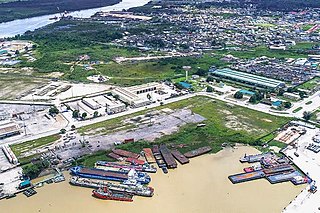
The city of Warri is an oil hub within South-South Nigeria and houses an annex of the Delta State Government House. Warri City is one of the major hubs of the petroleum industry in Nigeria. Warri, Udu, Okpe and Uvwie are the commercial capital of Delta State with a population of over 311,970 people in 2006. The city is the indigenous territory of Itsekiri, Urhobo and Ijaw people.

The Ijaw people, otherwise known as the Ijo people, are an ethnic group found in the Niger Delta in Nigeria, with significant population clusters in Bayelsa, Delta, and Rivers. They also occupy Edo, Ondo, and small parts of Akwa Ibom. Many are found as migrant fishermen in camps as far west as Sierra Leone and as far east as Gabon. They account for about 1.8% of the Nigerian population according to CIA Factbook. The Ijaws are one of the most populous tribes inhabiting the Niger Delta region and the eighth largest ethnic group in Nigeria.

Patani, or the Sultanate of Patani was a Malay sultanate in the historical Pattani Region. It covered approximately the area of the modern Thai provinces of Pattani, Yala, Narathiwat and part of the northern modern-day Malaysian state of Kelantan. The 2nd–15th century state of Langkasuka and 6–7th century state of Pan Pan may or may not have been related.
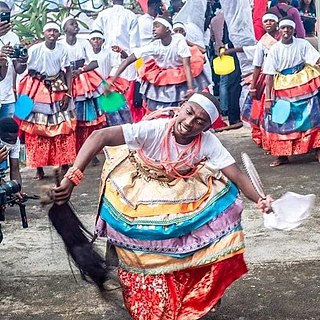
The Itsekiri are one of the Yoruboid subgroup of Nigeria's Niger Delta area, They speak a Yoruboid language and can be found in Delta State. The Itsekiris presently number 2.7 million people and live mainly in the Warri South, Warri North and Warri South West local government districts of Delta State on the Atlantic coast of Nigeria. Significant communities of Itsekiris can be found in parts of Edo and Ondo states and in various other Nigerian cities including Lagos, Benin City, Port Harcourt and Abuja. Many people of Itsekiri descent also reside in the United Kingdom, the United States and Canada. The Itsekiris are closely related to the Yoruba of South Western Nigeria and also close to the Okpe people and Edo peoples. The Itsekiris traditionally refer to their land as the Kingdom of Warri or 'Iwere' as its proper name – which is geographically contiguous to the area covered by the three Warri local government districts. The area is a key centre of Nigeria's crude oil and natural gas production and petroleum refining and the main town Warri forms the industrial and commercial nucleus of the Delta State region.

Grace Alele-Williams OON, FMAN, FNAE was a Nigerian professor of mathematics education, who made history as the first Nigerian woman to receive a doctorate, and the first Nigerian female vice-chancellor at the University of Benin.
Sapele is a primary town and one of the Local Government Areas of Delta State, Nigeria.

The Legends of Africa reflect a wide-ranging series of kings, queens, chiefs and other leaders from across the African continent including Mali, Benin, Ghana, Nigeria, Congo, Ethiopia, Eritrea and South Africa.

Nana Olomu (1852–1916) was an Itsekiri chief and palm oil merchant from the Niger Delta region of southern Nigeria. He was the fourth Itsekiri chief to hold the position of Governor of Benin River.
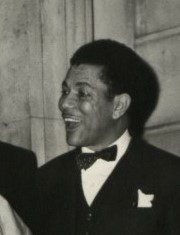
Chief Arthur Edward Prest was an Itsekiri politician of biracial heritage from the Warri division of southern Nigeria.

Koko is the major town in and the headquarters of Warri North Local Government Area of Delta State, South South Nigeria. Koko is one of the major towns in the Niger Delta region with a rich history and is known for its unique cultural heritage, natural resources, and vibrant economy.
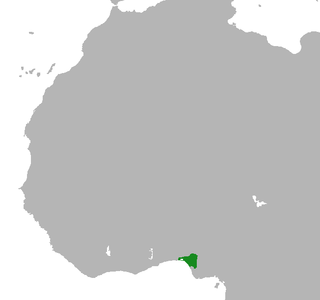
The Kingdom of Benin, also known as the Edo Kingdom or Benin Kingdom, was a kingdom within what is now southern Nigeria. It has no historical relation to the modern republic of Benin, which was known as Dahomey from the 17th century until 1975. The Kingdom of Benin's capital was Edo, now known as Benin City in Edo State, Nigeria. The Benin Kingdom was "one of the oldest and most developed states in the coastal hinterland of West Africa". It grew out of the previous Edo Kingdom of Igodomigodo around the 11th century AD, and lasted until it was annexed by the British Empire in 1897.
The Itsekiri language is a major branch of the Yoruboid group of languages, which as a group, is a key member of the Volta–Niger sub-family of the Niger–Congo family of African languages. Itsekiri is spoken by nearly 900,000 people in Nigeria as a first language and by many others as an additional language notably in the Niger Delta and in parts of Edo and Ondo states of Nigeria. The other key members of the Yoruboid group are Yoruba and Igala along with the various Yoruba dialects spoken in Benin and Togo.
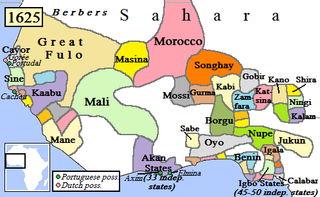
Nigerian traditional rulers often derive their titles from the rulers of independent states or communities that existed before the formation of modern Nigeria. Although they do not have formal political power, in many cases they continue to command respect from their people and have considerable influence in their community.

The Kingdom of Warri, Warri Kingdom or Iwere Kingdom, was established in 1480, was part of the Nigerian traditional states its ancestral capital is based in Ode-Itsekiri, Warri South LGA, Delta State, Nigeria with a palace erected in 1950s in the heart of the city of Warri, Warri South LGA, Delta State, Nigeria.

Hussey College Warri is a secondary school located along Upper Erejuwa Road in Warri, Delta State, Nigeria. It is one of the oldest and most prestigious colleges in Delta State and Nigeria, having produced many notable figures in the Nigerian professional and political scenery. The school has literally raised several generations of Nigerians from all tribes and backgrounds and schooled them in the best tradition of scholarship, athleticism, citizenship and morality. The 60th anniversary celebration of the foundation of Hussey College, Warri was organised by the Old Students Association in 2007.

James Robert Phillips was the deputy commissioner and consul for the Niger Coast Protectorate. He is remembered for his part in the events that led to the Benin Expedition of 1897. In 1897, Phillips set out to petition the Oba of Benin, although his reasons for doing so remain unclear. He and his party were ambushed and slaughtered as they approached Benin City, with Phillips being among the casualties. Though Phillips had acted without consulting the Royal Niger Company authorities, after his death the British government dispatched an punitive expedition against the Benin monarchy, which the force defeated and deposed, leading to the kingdom's eventual absorption into colonial Nigeria.
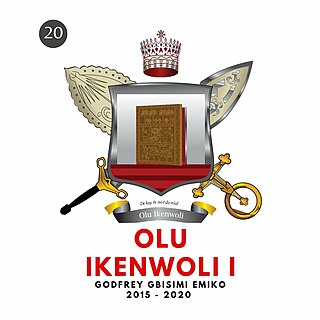
Ikenwoli Godfrey Emiko was a Nigerian traditional ruler.
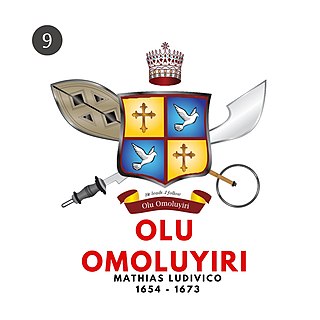
Olu Omoluyiri was the 9th Olu of the medieval Nigerian Warri kingdom who ruled over the Itsekiri and non Itsekiri people in the kingdom. He was the brother to Olu Oyenakpagha, the 8th Olu of Warri Kingdom and the son to Olu Atuwatse I, the 7th Olu of Warri. He succeeded his brother, Olu Oyenakpagha as the 9th Olu of Warri. His Portuguese name was Mathias Ludivico. He married a Portuguese noblewoman and was succeeded by his son Olu Abejoye.
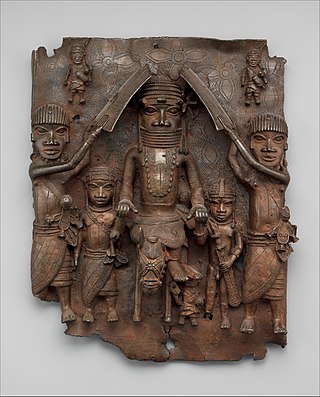
Olua was the fourteenth Oba of Benin who reigned from c. 1473 AD – c. 1480 AD. He was the second child of Ewuare. Olua's reign is noted for his actions and the establishment of the Itsekiri kingdom through his son Iginuwa.
References
- ↑ Professor Henry Louis Gates, Jr.; Professor Emmanuel Akyeampong; Mr. Steven J. Niven (2 February 2012). Dictionary of African Biography. OUP USA. pp. 1–. ISBN 978-0-19-538207-5.
- ↑ Kathleen E. Sheldon (2005). Historical Dictionary of Women in Sub-Saharan Africa. Scarecrow Press. ISBN 978-0-8108-5331-7.
- 1 2 3 4 Lloyd, P. C. "The Itsekiri in the Nineteenth Century; An Outline Social History." The Journal of African History 4, no. 2 (1963): 207-31. JSTOR 179535.